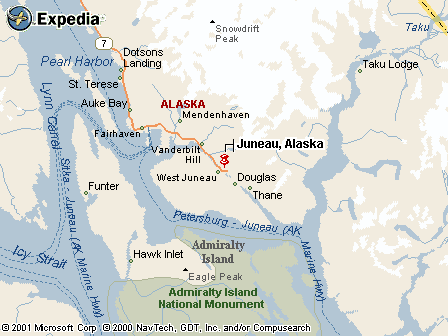|
|
Canku Ota |
|
|
(Many Paths) |
||
|
An Online Newsletter Celebrating Native America |
||
|
June 15, 2002 - Issue 63 |
||
|
|
||
|
Celebration: Making the Connections |
||
|
by Riley Woodford The
Juneau Empire © 2002
|
||
|
credits: Celebration:
A procession of about 1,600 Native dancers and singers marches on Front
Street on Saturday. The three-day biennial gathering of Tlingit, Haida
and Tsimshian tribal members for traditional singing, dancing and other
cultural activities ended Saturday, on the 20th anniversary of the event.
Drummers for the Sitka Kaagwaataan Dancers perform on the first day
of Celebration 2002.
Brian Wallace/ The Juneau Empire |
|
"Coming and seeing the dancers, the pride and traditions and togetherness, I was just overwhelmed," she said. "You can be brought up totally aside from the tradition and you come to this and it reaches down so deep inside you - and it's there." Welch is a Tlingit from Whitehorse, Yukon Territory. She returned to Celebration this year with her parents. She said she grew up with some elements of her Tlingit traditions, but not a lot. Her mother and grandmother had been distanced from their heritage. Celebration is part of a process in recent years that has reconnected them. For Native people such as Welch and her family, their experiences this weekend in Juneau will resonate. Welch said that summer of 1998 was profound. In addition to Celebration, she spent a week on the Taku River at her uncle's fish camp. That same summer she escorted her grandmother to a Tlingit language seminar in Ketchikan. All those things helped her - and her family - resurrect parts of their heritage. Josephine Huff, Welch's mother, said she was born on a trapline in Northern British Columbia in March 1940. She spoke Tlingit as a child growing up in the Atlin area, but not as a teen-ager. "I was sent to residential school and lost it," Huff said. "Grandma lost it as well when she was sent to school. She relearned it later from her mother-in-law." Experiences like that were typical for Natives of those generations. Don Bremner works with the Sealaska Heritage Institute and helped organize Celebration. He said a woman recently brought a document to his office to show him. It was a certificate her grandfather, a Tlingit and an early Juneau resident, had signed agreeing to give up his language and culture to become an American citizen.
Bremner said five non-Native Juneau residents also signed the document as witnesses, testifying that he had "abandoned all tribal habits and customs and adopted the habits of civilized life." "Society has to see our language, our songs and dances are something valuable," Bremner said, "to see how important it is not only to Natives but to all society to support Native cultures in Alaska. There's so many positive things that can come out of this." For Welch and her family, Celebration has revitalized their traditions. She said it also helps Natives who are finding the balance between contemporary society and a modern lifestyle and their traditional culture. "It's a coming together again, finding out where you're from and what you're about," Welch said. "Getting in touch with that inner part of yourself makes you realize what is at stake if we don't pass on the songs and stories. In our part of the world there's not a lot of elders left. The more involved you are, the more you realize 'I'm Tlingit. ' " Krystal Meachem, 9, was enjoying the sun on the Centennial Hall lawn Friday afternoon with her cousin Emily. They had been watching the dancing inside and were finishing an afternoon snack. "I'm beginning dancing," Krystal said. "My grandmother is teaching me to dance. I know a little about how to speak (Tlingit), too. She's teaching me what she learned." She said she's thankful for the dancing and the performers who came to share. "I think kids should know how their culture lives," she said. "Because it's special to have the culture. It expresses your feelings."
|
||||||
|
|
||
|
|
||
| Canku Ota is a free Newsletter celebrating Native America, its traditions and accomplishments . We do not provide subscriber or visitor names to anyone. Some articles presented in Canku Ota may contain copyright material. We have received appropriate permissions for republishing any articles. Material appearing here is distributed without profit or monetary gain to those who have expressed an interest. This is in accordance with Title 17 U.S.C. section 107. | ||
|
Canku Ota is a copyright © 2000, 2001, 2002 of Vicki Lockard and Paul Barry. |
||
|
|
|
|
|
The "Canku Ota - A Newsletter Celebrating Native America" web site and its design is the |
||
|
Copyright © 1999, 2000, 2001, 2002 of Paul C. Barry. |
||
|
All Rights Reserved. |
||

 Toni
Welch experienced an epiphany at her first Celebration in 1998.
Toni
Welch experienced an epiphany at her first Celebration in 1998.
 "I
can't say his name, but it was in 1919," Bremner said. "You
can look in the state archives - you can see the pressure placed on
our ancestors to give up their traditional ways."
"I
can't say his name, but it was in 1919," Bremner said. "You
can look in the state archives - you can see the pressure placed on
our ancestors to give up their traditional ways."